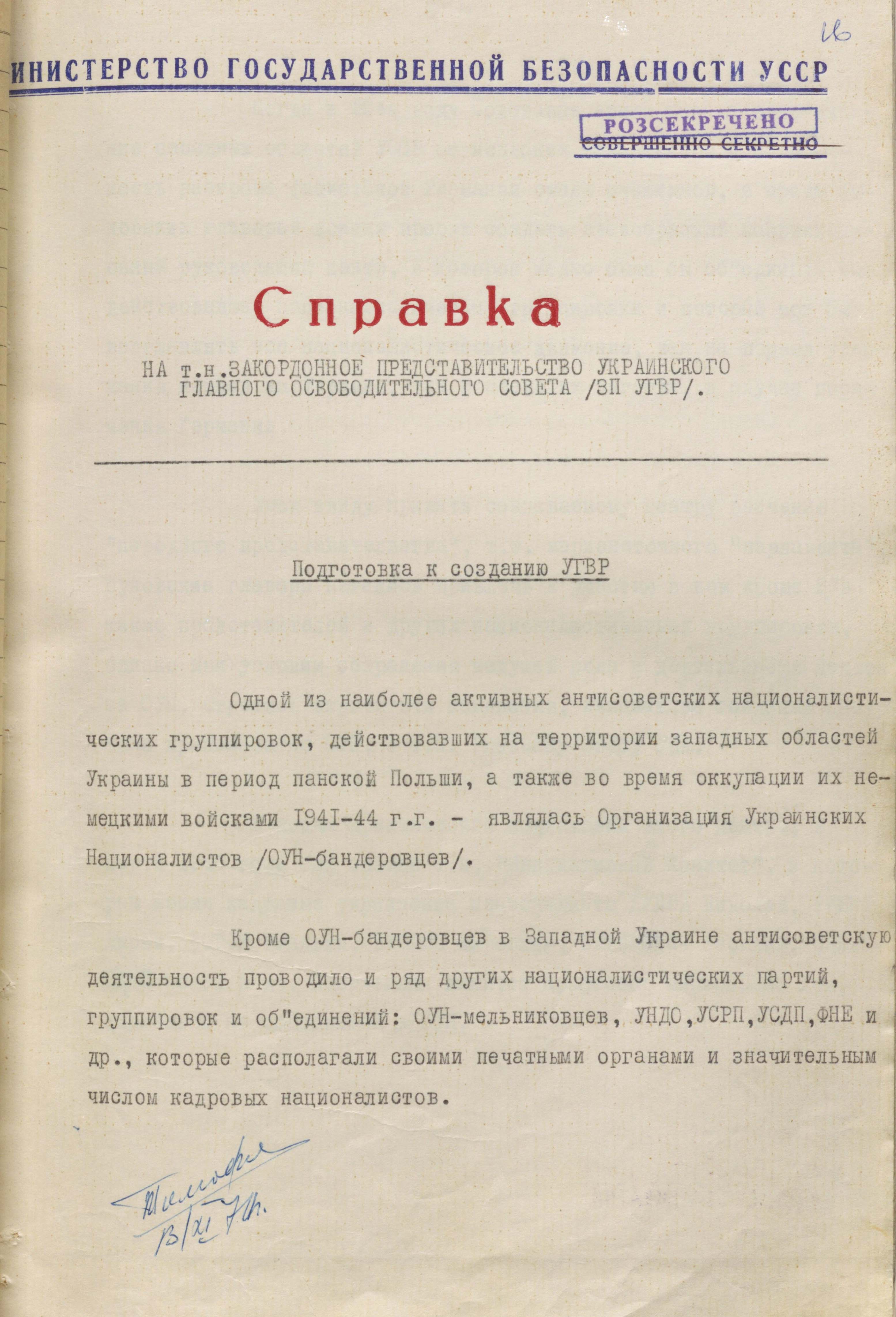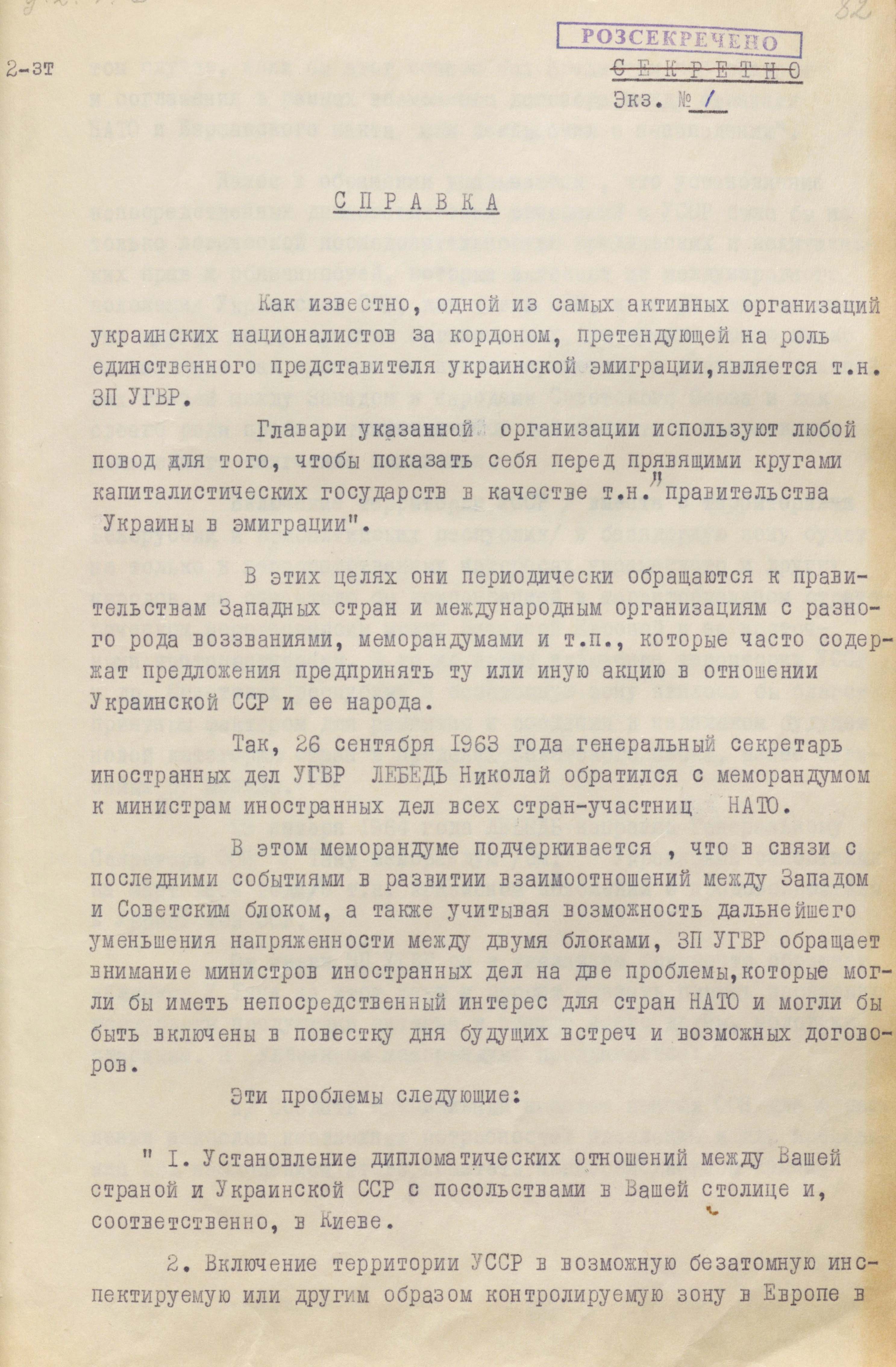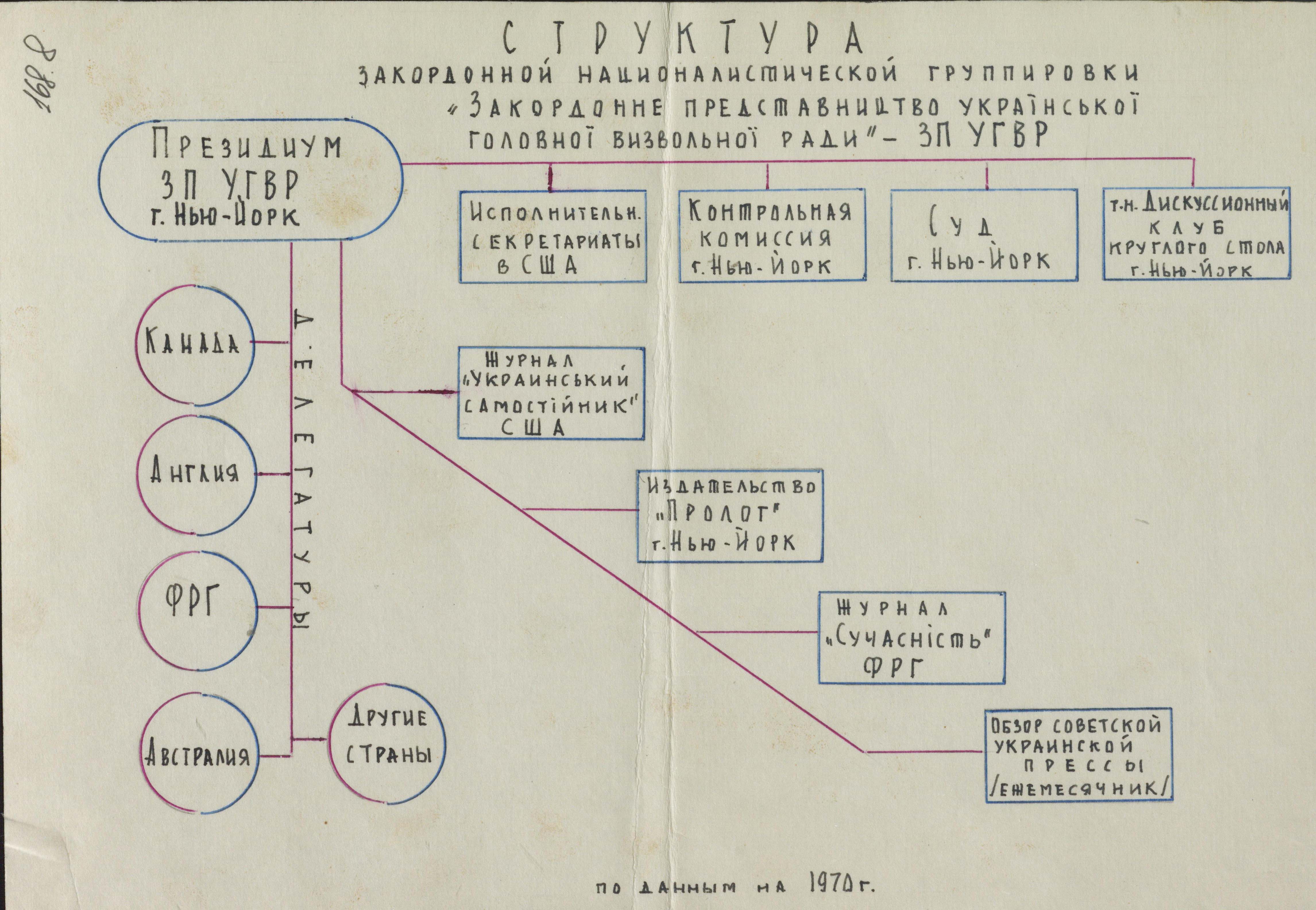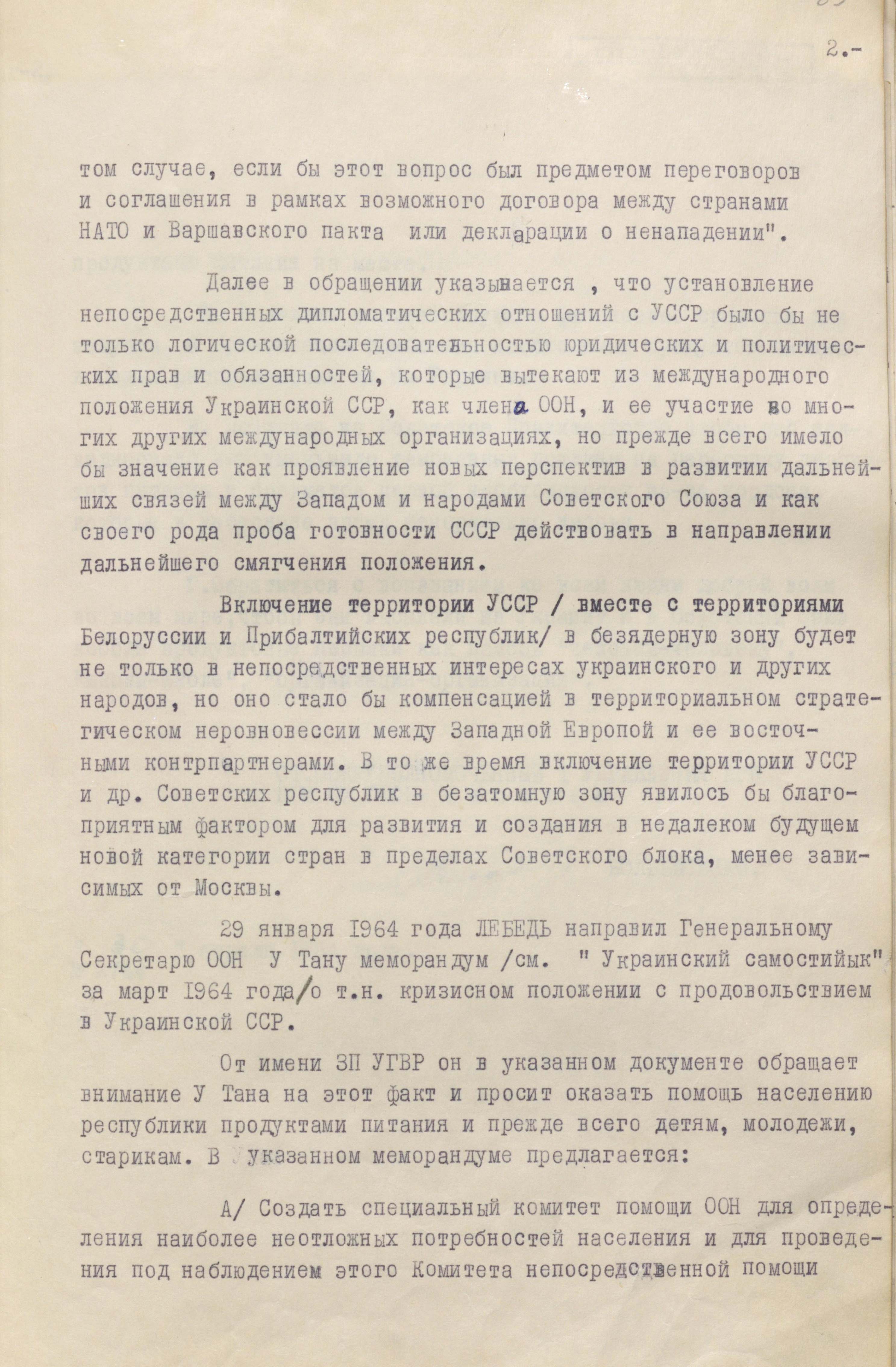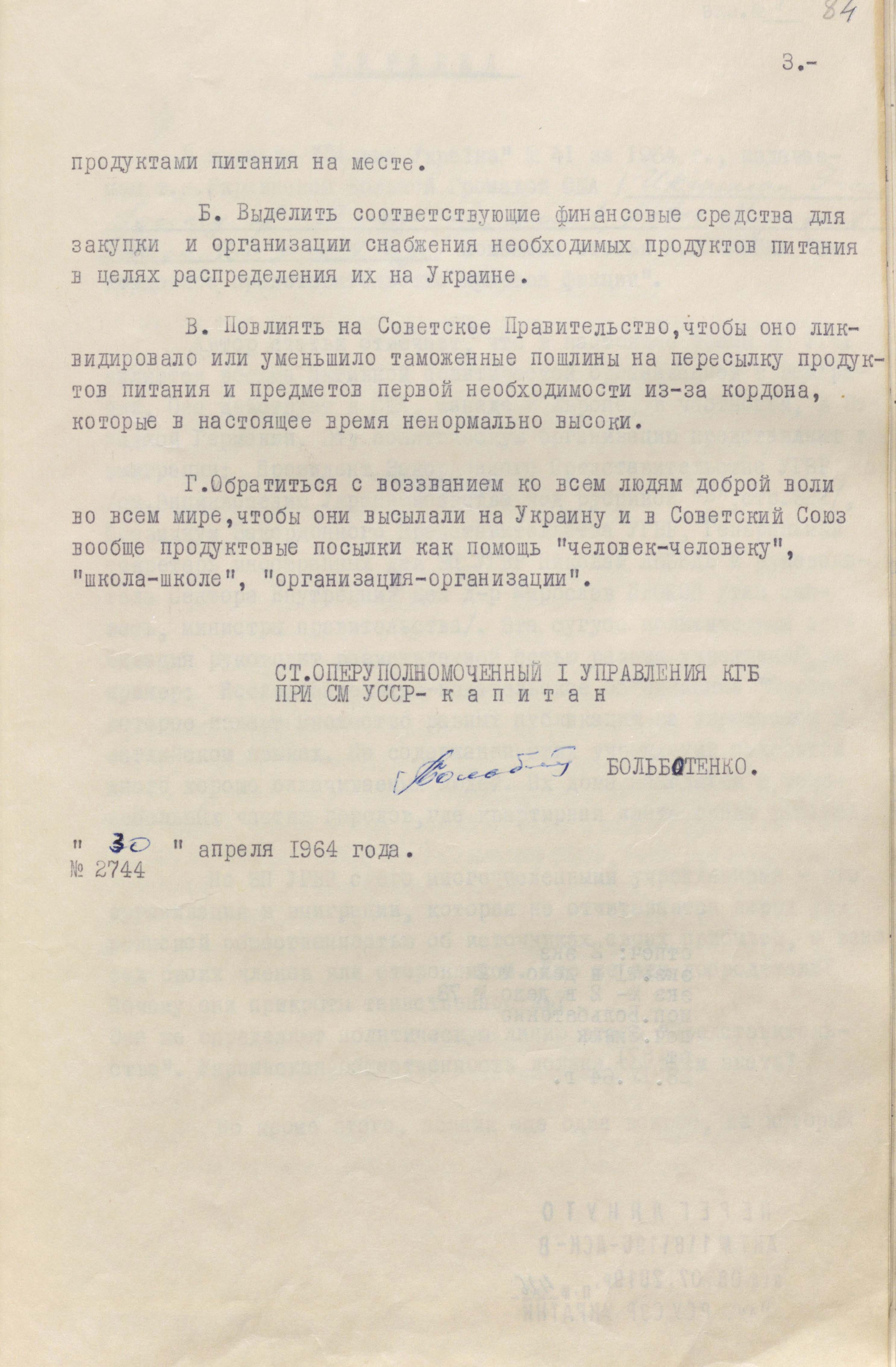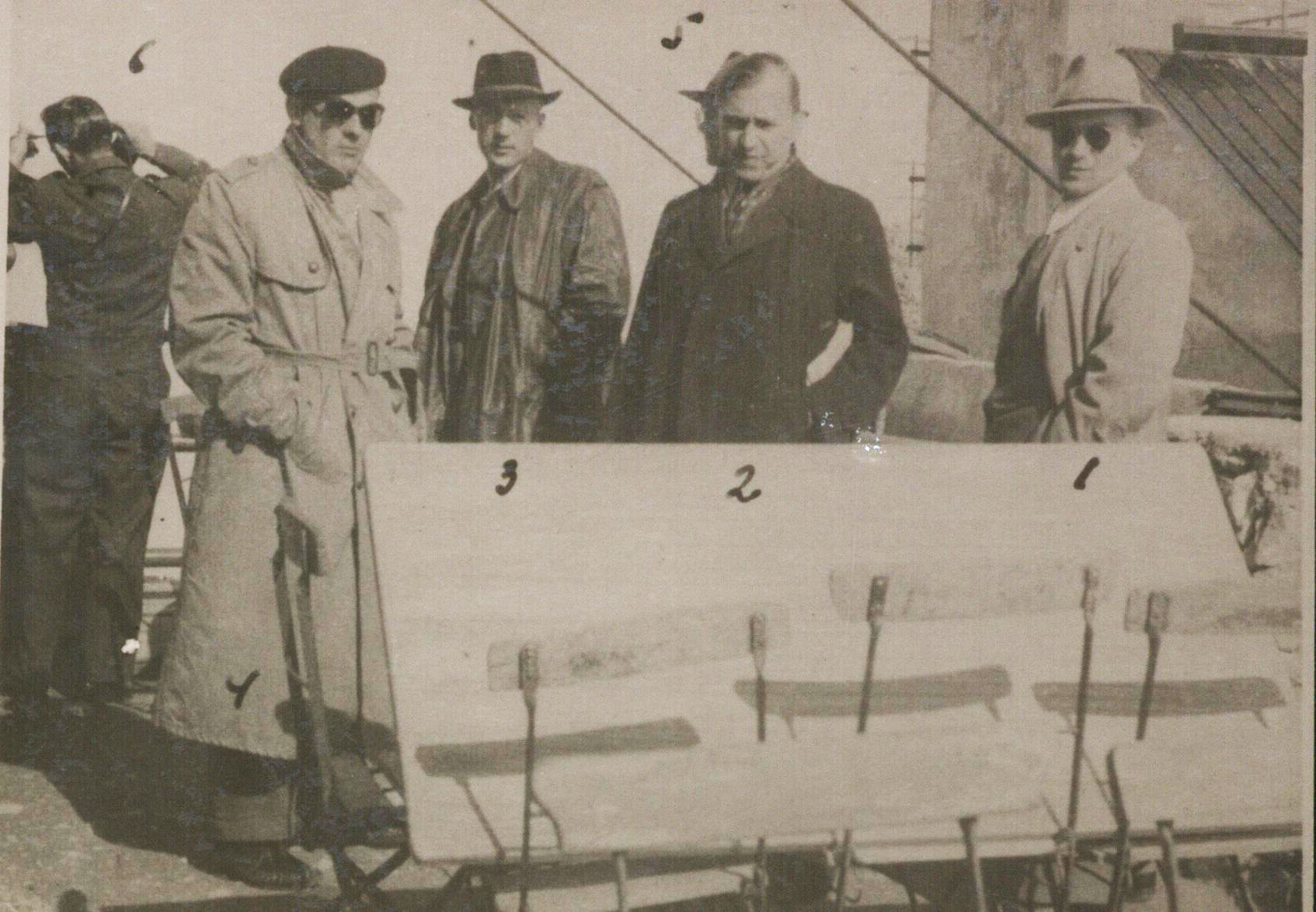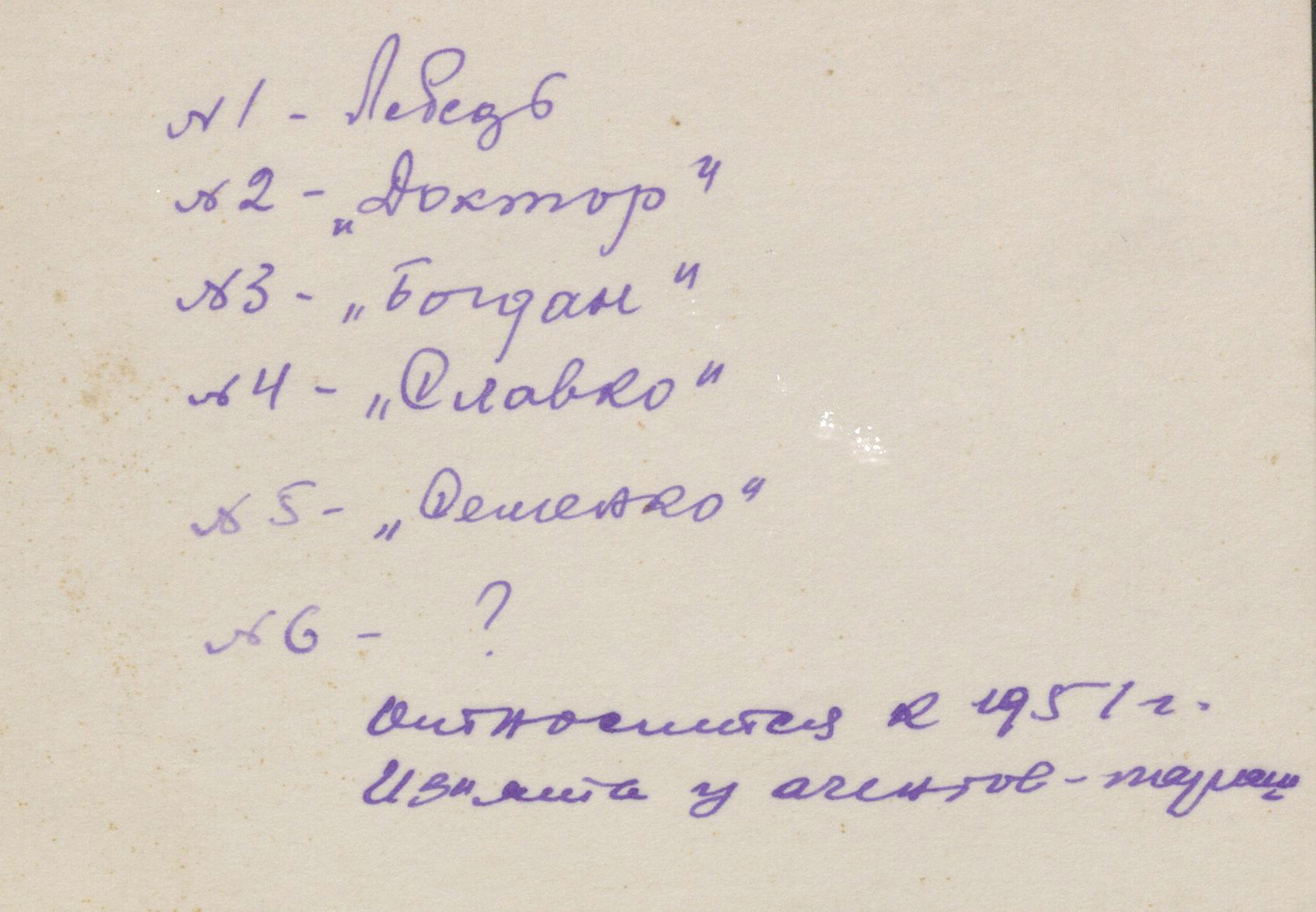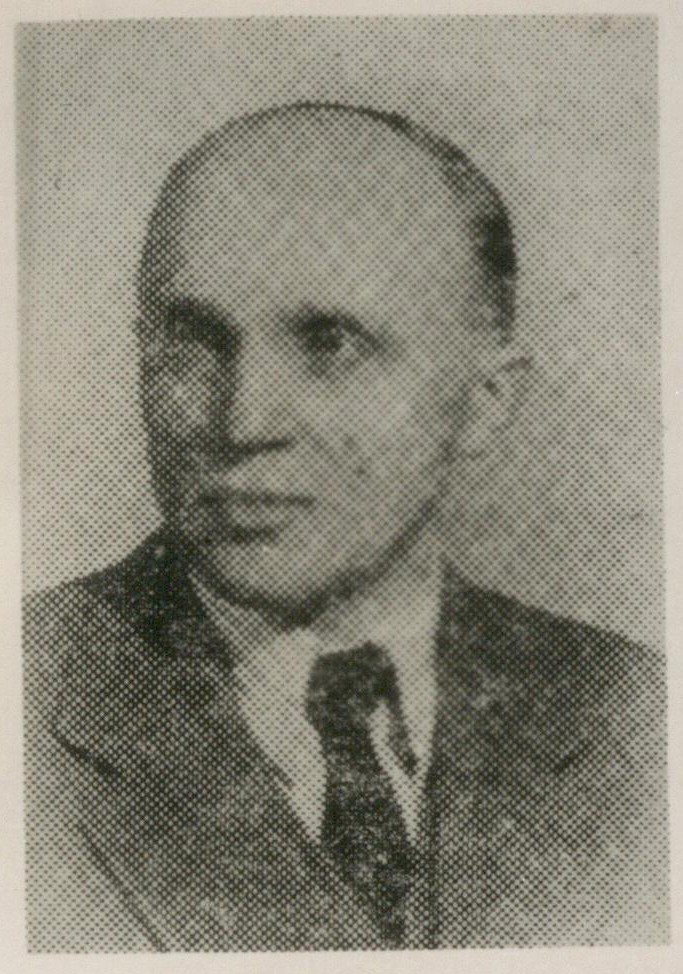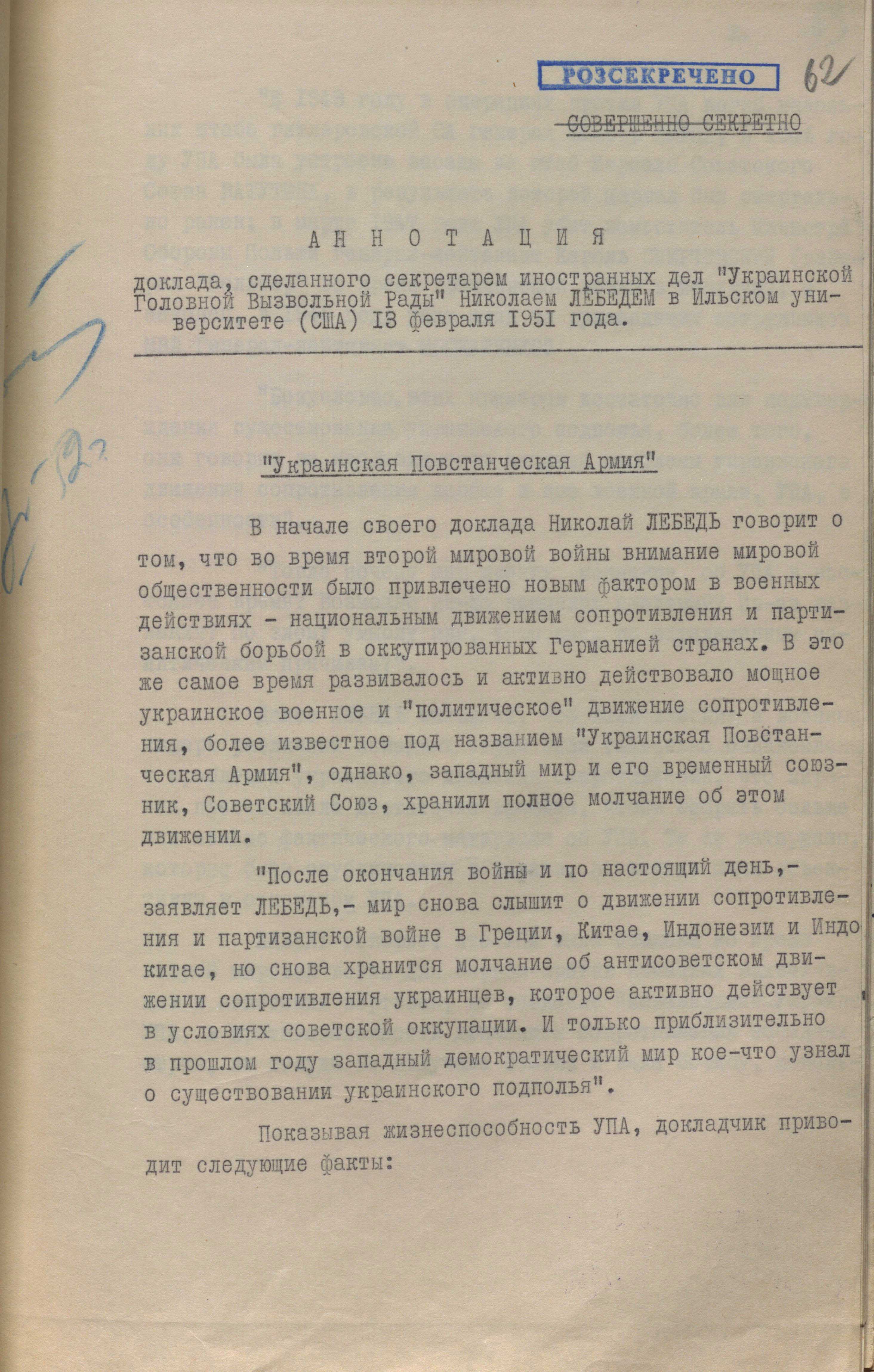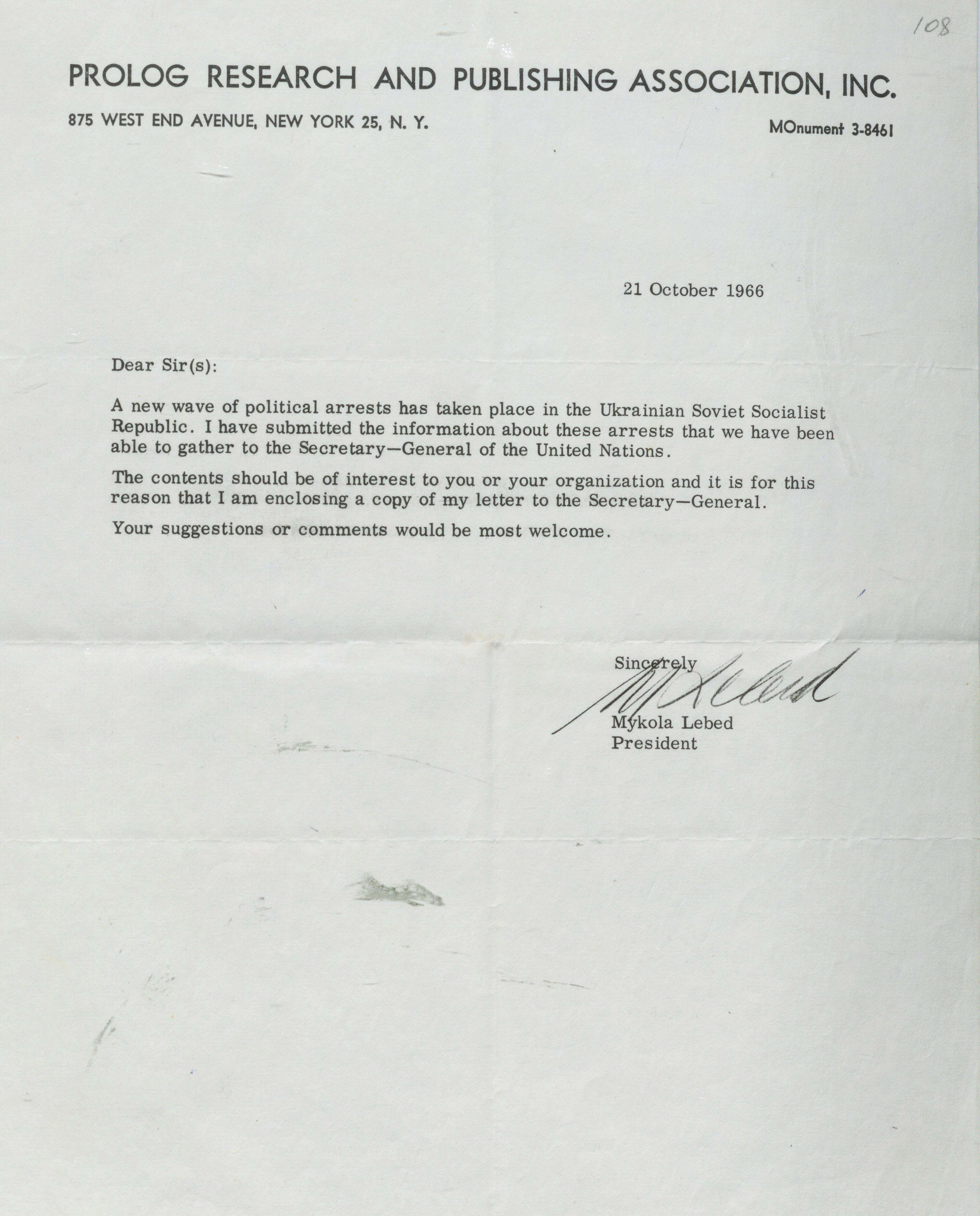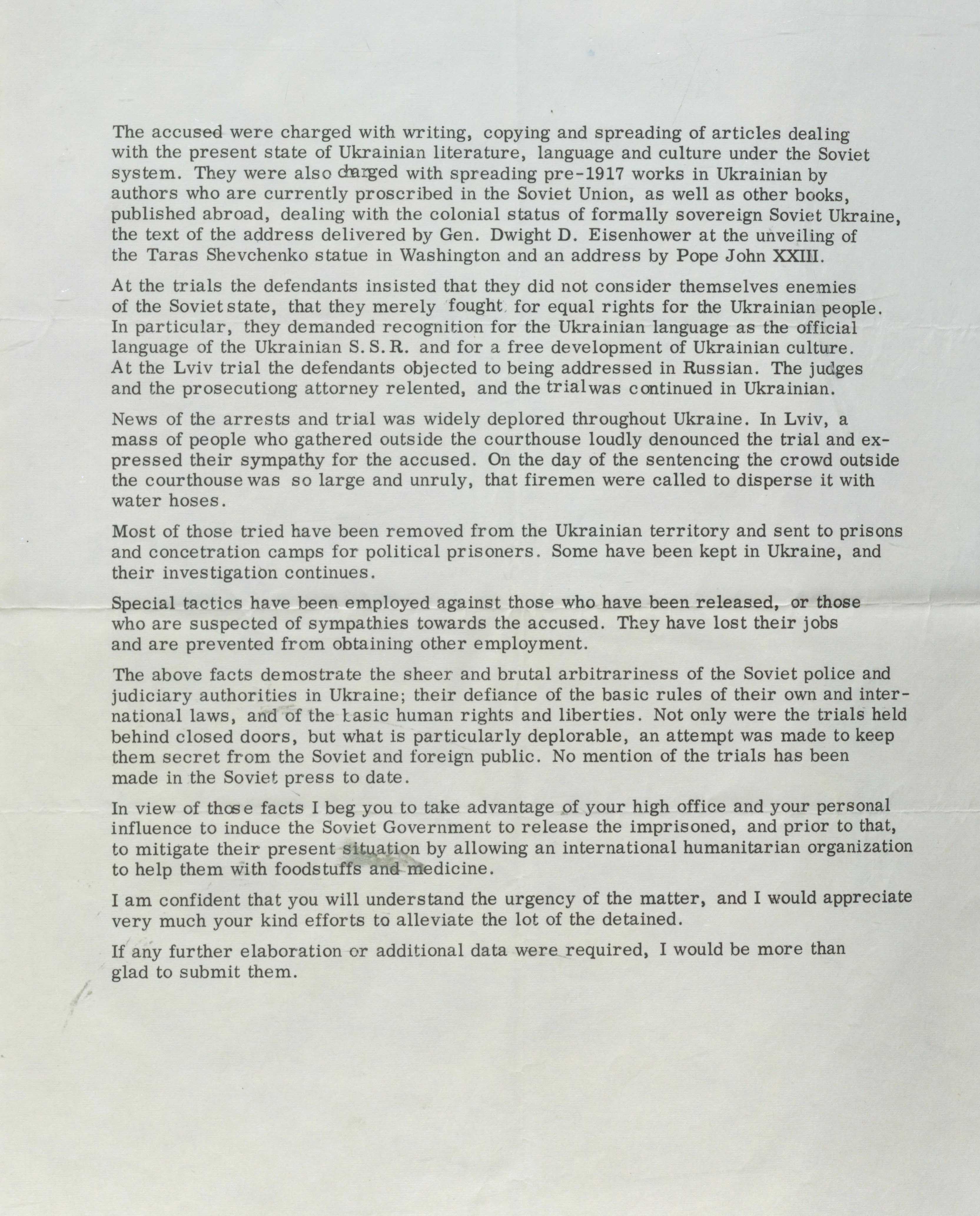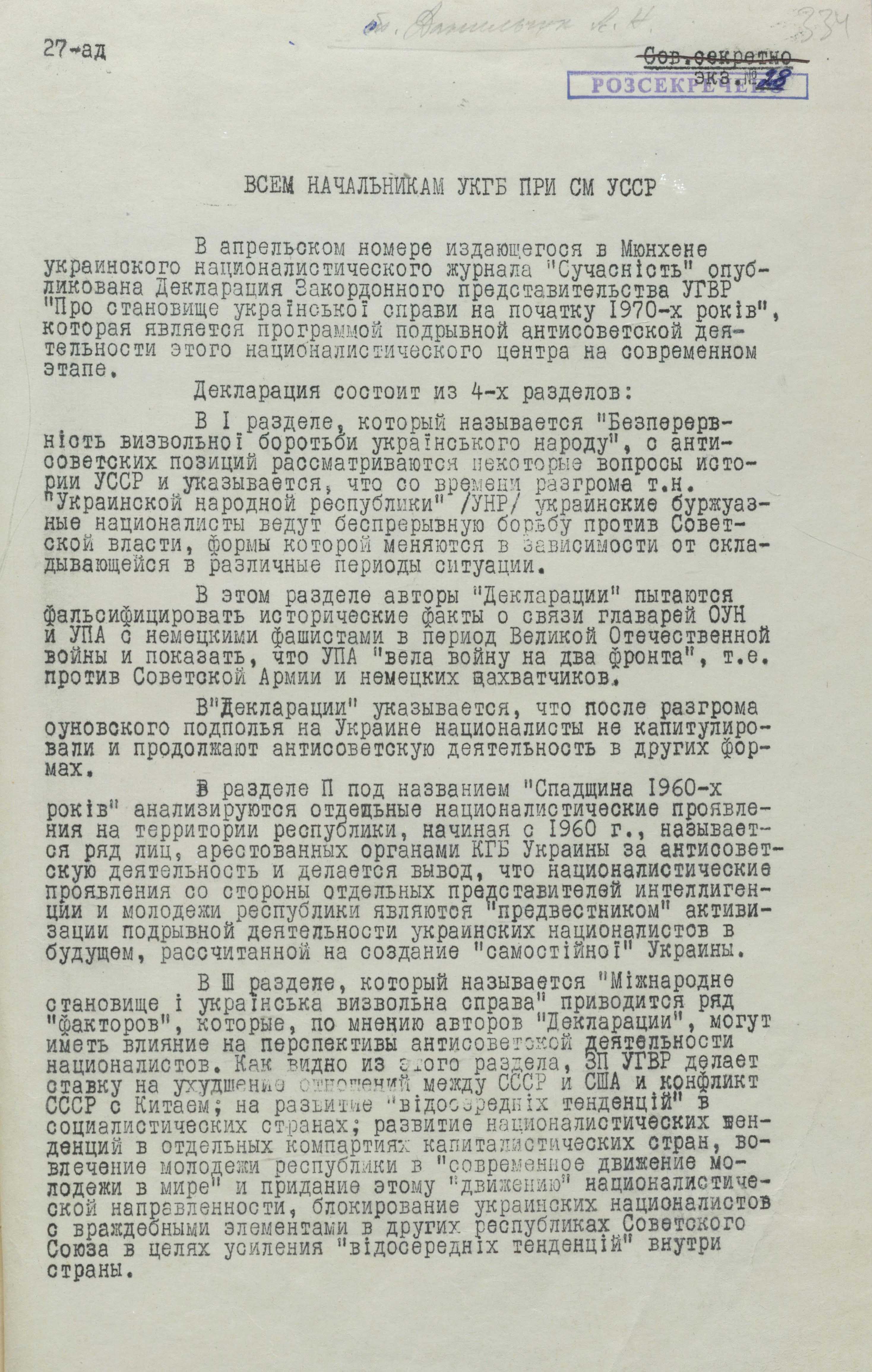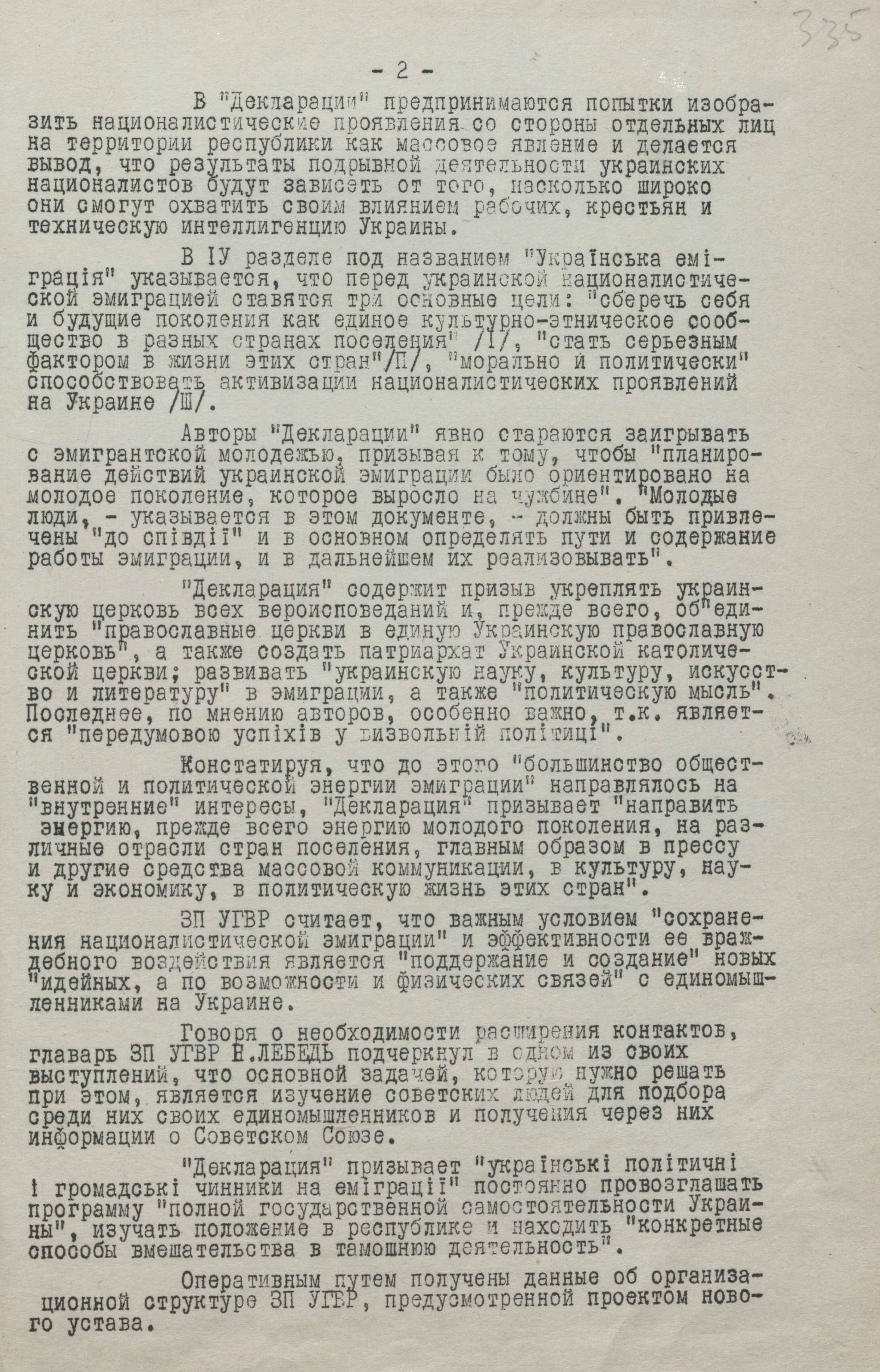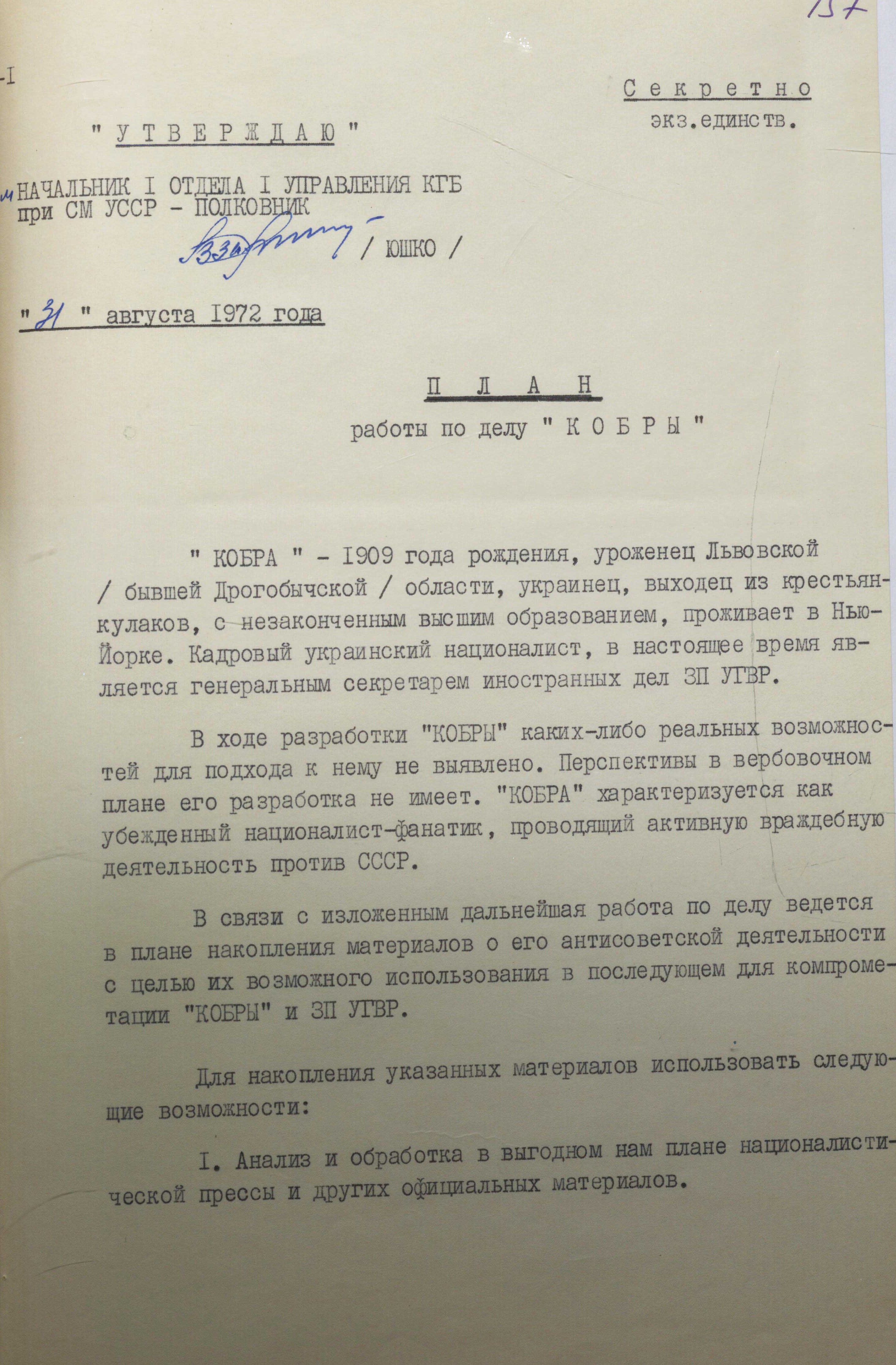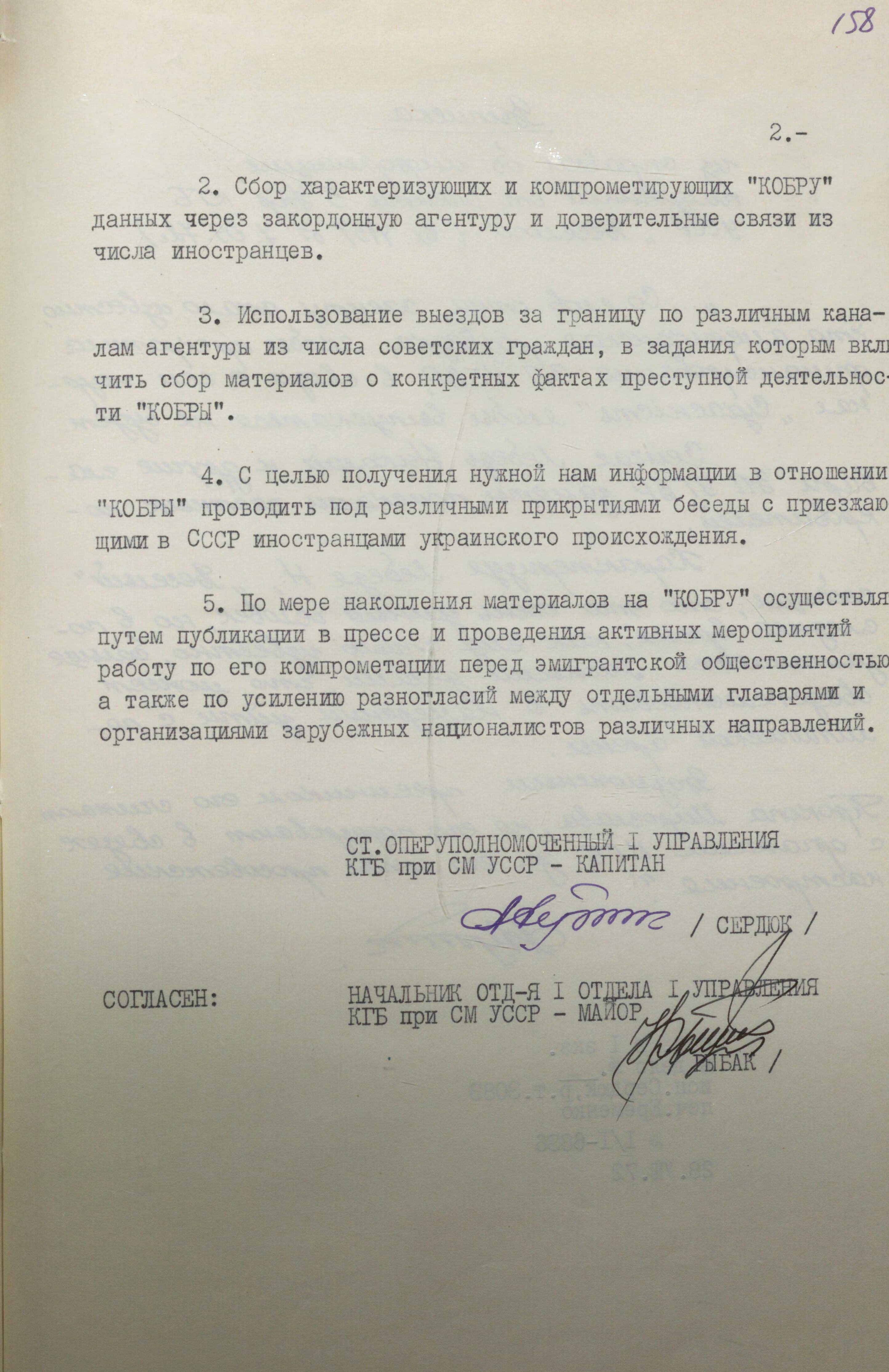UHVR’s Foreign Mission. “America Will Help Us!”
12/11/2024
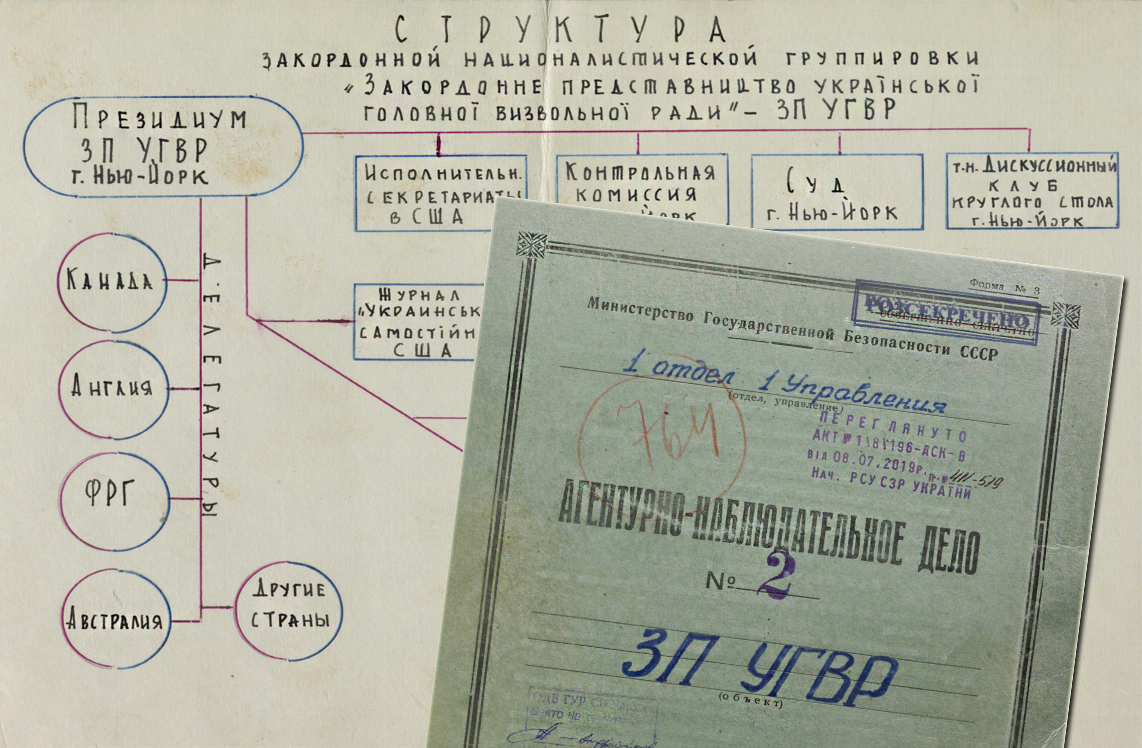
In the late 1940s, the leading figures of the Ukrainian national liberation movement came to the conclusion that in order to preserve the lives of people and forces in further struggle for Ukraine's independence, it was necessary to change the strategy and tactics. One of the elements of this was the decision to turn for help to the strongest democracies of the world of the time. Along with conducting joint special operations, this cooperation was to be crucial in providing moral support for the liberation struggle, drawing attention to the Ukrainian issue, and conveying to the world community the understanding that Ukrainians and russians are not one community, not one people, as many people abroad believed due to a lack of understanding of all aspects of history. New declassified documents from the archives of the Foreign Intelligence Service of Ukraine tell us this.
“To Achieve the Widest Possible International Support”
After the nkvd of the Ukrainian ssr received information in 1944 about the creation of the Ukrainska Holovna Vyzvolna Rada (UHVR) (Ukrainian Supreme Liberation Council – Transl.) and seized the minutes of the founding meeting of this insurgent provisional Parliament or Government of warring Ukraine, checkists were faced with the task of finding all its active figures. But the search on Ukrainian soil proved to be in vain. According to the decision of the Presidium of the UHVR, the leadership of the newly formed structure, headed by Kyrylo Osmak and Secretary General of Military Affairs Roman Shukhevych, had to stay in Ukraine as a must and continue the armed struggle. Others could go abroad and organize the work there. They did use this right.
Soon Ivan Hryniokh, Mykola Lebed, Myroslav Prokop, Daria Rebet, Fedir Vovchuk, Vasyl Mudryi, Omelian Lohush, and other participants in the UHVR founding meeting left for Europe. In February 1946, in Munich, they convened a conference, where they formalized the creation of the Foreign Mission (FM) of the UHVR as a supra-party formation. According to archival documents, Vasyl Mudryi was elected Chairman of the Presidium of the Mission. But a few months later, he resigned and Ivan Hryniokh became the head of the Foreign Mission of the UHVR.
One of the tasks at that stage was to establish contacts with representatives of other countries in order to achieve the widest possible international support for further struggle for Ukraine's independence. Given the lack of own capabilities, the main goal of the cooperation was to attract military, political, operational and other resources of the countries of the anti-communist camp in order to fight the soviet union until its collapse.
All of this greatly concerned the mgb, which reported in its documents that a new political force was gaining momentum in the emigrant community along with the Foreign Units of the Revolutionary OUN led by Stepan Bandera and the Provid of Ukrainian Nationalists under the leadership of Andriy Melnyk. Therefore, the UHVR and its active members became subject to operational cultivation.
Special attention was paid to monitoring the movements of Mykola Lebed, who at the time was the UHVR’s Secretary General of Foreign Affairs, i.e. responsible for establishing international contacts. The following was written in operational reports on this matter:
“In 1944, Lebed sent a member of the OUN Roman Myrovych to Rome with letters to the Italian and British governments. Upon his arrival in Rome, and then in London, Myrovych was to tell about the existence of the Ukrainian Liberation Front in Halychyna and Volyn, about the OUN program, and to obtain permission from the British to bring the OUN delegation to London. In addition, Myrovych had a special task from Lebed to contact the “Mykolaichyk government” in London...
In early 1945, he sent his contact agent, Yaroslav Horishnyi, to Switzerland to establish contact with the British Embassy. But Horishnyi did not fulfill his task, as he was detained by the Germans on the Swiss border.
In August 1945, Lebed, together with his wife and personal aide (pseudonym “Slavko”) visited Rome, where he established contact with representatives of the British Command in Italy and prepared the ground for sending representatives of the OUN to France, Belgium, England and America...
In 1946, in Italy, Lebed got in touch with a representative of the American political intelligence “DID” Novak, with whose assistance he strengthened his position in the American intelligence...
In 1947, Lebed was in Paris, where he managed to send several slanderous anti-soviet letters to the Council of Foreign Ministers [of France] on behalf of the UHVR” (BSA of FISU.- F.1. – Case 648. - Vol. 4. - P. 4-6).
The main aim of those trips was to draw the attention of the governments of democratic countries to the Ukrainian issue, to inform about the activities of the Ukrainian Insurgent Army, about which the world knew almost nothing, and soviet propaganda presented information about it in a distorted light, to tell about the terrible crimes committed by the stalinist regime against those who stood up to defend their native land from the Nazi and moscow occupiers. It was important to convey the truth and find support for this struggle.
The leaders of the Ukrainian national liberation movement attached particular importance to establishing contacts with the American side. It was the United States that was seen as a real force capable of resisting the ussr. According to reports of the mgb agents, discussing this issue in a narrow circle of supporters, representatives of the UHVR were optimistic and repeatedly emphasized that “America will never let us down” and “America will help us”.
The heads of foreign emigration centers undertook to supply intelligence information about the ussr in exchange for assistance in continuing the struggle, ensuring the loyalty of governments to the Ukrainian liberation movement, training in special educational institutions, supplying weapons, ammunition and equipment, and providing financial subsidies.
These contacts are repeatedly mentioned in declassified documents from the archives of the Foreign Intelligence Service of Ukraine. In particular, agent of the mgb of the Ukrainian ssr “Maiskyi” wrote as follows:
“...through the Vatican, in particular, in early 1946, with the support of one of the Papal Cardinals and Bishop Buchko, Lebed and Hryniokh, as representatives of the UHVR abroad, established contact with a representative of American political intelligence, Novak.
Already then, Lebed and Hryniokh passed on to Novak a number of spy information about Western Ukraine that Shukhevych had sent abroad. Novak highly appreciated those spy materials. Obviously, Novak, on the one hand, and Lebed and Hryniokh, on the other hand, came to a complete understanding with American intelligence on the issues of cooperation between them and the OUN...
At the same time, Lebed, in agreement with Bandera, instructed Yuri Lopatynskyi to organize and head an independent intelligence department to cooperate with Novak and manage the counterintelligence department to cooperate with Novak's friend, American Bill.
The former department was given an English name, or rather, an abbreviated name from the first letters of English words, similar to the American “CIA” (BSA of FISU- F.1. - Case 648. - Vol. 3 - P. 296-299).
In addition to “Maiskyi”s testimony, one of the generalized kgb reports contains a separate section entitled “The Foreign Mission of the UHVR’s Relations with American Intelligence”. It states that the leaders of the UHVR FM did manage to establish close contacts with representatives of American intelligence at different time and through various channels, and receive their support and material assistance. It is pointed out that, along with M. Lebed, who took the first steps towards rapprochement in Rome, the same work was carried out by UHVR member Yevhen Vretsiona in Paris.
In declassified archival documents of FISU, Ye. Vretsiona is listed as the Chief of the Intelligence of the OUN Foreign Center with the underground pseudonym “Volianskyi”. It is reported that as a member of the OUN's foreign relations referentura, he was engaged in establishing contacts with foreign countries in 1943-1944. This referentura was engaged in intelligence. And from September 1944 to August 1945, he headed the Foreign Relations Department, a structure whose responsibilities included the protection of the OUN Central Leadership. That is, he was well versed in the organization of intelligence and its activities.
The mgb report also states that “in 1946, the UHVR’s Foreign Missions sent Myroslav Prokip to Paris specifically for contacts with Americans. He established contact with US Senator Vanderbilt and handed him a number of slanderous “documents” about the situation in Ukraine. In 1947, a member of the UHVR, Zenon Pelenskyi, under the auspices of the so-called TsPUE [Central Representation of Ukrainian Emigration], unofficially established ties with the American occupying administration in Frankfurt” (BSA of FISU. - F.1. - Case 12260. - Vol. 6 - P. 35-36).
That is, it was a purposeful, multi-stage work for the future. And evidence of these contacts has been preserved in the archives of not only FISU, but also the of the US CIA.
“Operation “Belladonna”
In the early 2000s, the US Central Intelligence Agency declassified archival materials that shed light on the establishment of contacts and the beginning of cooperation between the CIA and the UHVR. These documents are stored in the US National Archives. They describe the nature of the agreement on the basis of which the two sides cooperated, and provide important information about first special operations at the beginning of the Cold War.
One of the documents, entitled “Operation “Belladonna”, describes the circumstances under which and why the US government came into contact with the UHVR in Rome, and why the UHVR was chosen as a partner. It is noted that the cooperation was beneficial to both sides and was aimed at supporting the Ukrainian liberation movement, on the one hand, and at providing information about soviet plans in postwar Europe, on the other.
Open sources report that this document was prepared in November 1946. It consists of 25 pages of an overview of Ukrainian organizations operating in Europe, biographies of their leaders, and an assessment of their ability to be useful in obtaining intelligence for the United States.
Among the whole range of organizations, the report singles out two: the UHVR and the OUN led by Stepan Bandera. According to the document, the first contact with an unnamed American intelligence officer took place with high-level representatives of the UHVR in April 1946 in Rome with the help of the Ukrainian Greek Catholic Church's connections in the Vatican.
The document says that from the very beginning, the Ukrainians made it clear that they considered themselves not agents but partners of the Americans, and that their grassroots agents should not know about all aspects of their work. It is confirmed that contacts were established with the highest-level representatives of the UHVR – Ivan Hryniokh, Yuriy Lopatnytskyi and Mykola Lebed.
The document contains evidence of personal qualities and features of character of the people with whom the communication took place. It was noted that they were determined and capable people, but had the psychology of persecuted people and were ready to sacrifice their lives or even commit suicide if it helped their cause. They also “are ready to work with us or without us, and, if necessary, against us” and “do not seek personal gain or benefit”. The paper also emphasized the need to always remember that Ukrainians have almost religious faith in their nation and do not trust anything foreign.
With this information taken into consideration, further relations were built, and individuals were selected from among the Ukrainian insurgents who were ready to undergo special training, cross the border, and continue their struggle on Ukrainian soil. After the underground began to suffer significant losses and the course of events showed the futility of armed resistance, it was decided to switch to other methods of struggle.
Working from the USA
The materials of the operational cultivation of the Foreign Mission of the UHVR point out that a number of its leading figures moved to the United States in the late 1940s and early 1950s and began work there at a new level. In particular, from December 1950 to April 1951, I. Hryniokh “established contact with the heads of the Central European and Eastern European divisions of the US Department of State, in conversations with whom he told them about the presence of remnants of the OUN underground in Ukraine and handed them a memorandum of the Foreign Mission of the UHVR about its struggle against the ussr”. Through those people, he obtained the opportunity to speak in the United States on radio and television. At the same time, he established contacts with representatives of the Military Intelligence. “Visiting Canada”, the mgb document states, “Hryniokh secured an appointment with Minister of Foreign Affairs Pearson, to whom he also handed a memorandum of the Foreign Mission of the UHVR... In 1949, on Lebed's instructions, Daria Rebet visited the United States to expand the UHVR's foreign relations” (BSA of FISU. - F. 1. - Case 12260. - Vol. 6. - P. 37-38).
In 1949, M. Lebed and his family moved to the United States. It is reported that he immediately established “especially close ties with various official and unofficial circles in America”. Another document refers to his establishing contacts with the Ukrainian Congress Committee of America (UCCA). “With the help of the UCCA”, the text says, “Lebed sought to influence the US Congress to support the position and policy of the UHVR regarding the upcoming war and a new solution to the international problem. Initially, he had some results in Congress, and the UCCA donated quite a few dollars for the activities of the Foreign Mission of the UHVR...” (BSA of FISU. - F.1. - Case 648. - Vol. 3. - P. 325).
The mgb analytical reports highlight the range of main tasks proclaimed by the leadership of the Foreign Mission of the UHVR. Among them there are as follows:
- all possible assistance and support for the Ukrainian liberation movement in Ukraine, strengthening and popularizing it in the world;
- development of ideological and programmatic issues of Ukraine's liberation;
- clear reflection of the position of the Ukrainian liberation process in Ukraine;
- active participation in political actions and cooperation with other political groups in exile;
- striving for complete consolidation of political forces abroad.
One of the ways to bring this information to the general public was through public speaking, in particular at American universities. The staff of the ussr mgb residentura in the United States made a detailed annotation on 14 printed pages of M. Lebed's report at Yale University. Having read the document, the mgb leadership in moscow sent it to the mgb of the Ukrainian ssr with instructions to thoroughly study it and develop a set of agent-operational measures aimed at countering this organization and compromising its leaders. An abstract of the report was also sent to the central committee of the communist party of Ukraine. Its resolutions stated that the activities of this hostile anti-soviet organization should be placed under special control.
What was so alarming to the chekists and the communist party bodies?
In his speech, M. Lebed emotionally described the activities of the Ukrainian Insurgent Army. He emphasized that during and after World War II, everyone in the world spoke and wrote about the resistance movement and guerrilla warfare in countries occupied by Nazi Germany, such as Yugoslavia, France, Czechoslovakia, Greece, and others, but never mentioning the UPA. He lamented that that struggle against the Nazi and moscow occupiers was waged without any outside help, only by the efforts of the Ukrainian people. He emphasized that that was the liberation struggle of the people for their right to live independently in a democratic world and that this aspiration deserved support.
“At first, the West did not know and did not understand what the Ukrainians were fighting for”, he said. “For the sake of preserving peace in the world, the West was ready to divide the world into two spheres of political domination and ignore what was happening in the soviet union. Here and in Western Europe, the possibility of peaceful coexistence between totalitarian communism and the democratic world seemed real and most rational. Lebed suggests that this is the main reason for the West's silence on the alleged internal difficulties in the soviet union. “At the time, this attitude of the West seemed quite reasonable, but now it has been almost proven that it was fatal”.
M. Lebed devoted much of his speech to the forces and methods by which soviet authorities tried to stifle the resistance movement in Ukraine. He spoke about the actions of the mgb, militia, and army units using artillery, tanks, and aircrafts. He gave examples of the burning of forests and settlements in Volyn region where rebel groups were hiding, the poisoning of water, food and medicines intended for them, and the deliberate infiltration of people with serious infectious diseases into those groups to massively infect the personnel. He spoke about repressions against the families of the insurgents and their forced deportation to the Siberia.
M. Lebed tried to convey to the American audience the idea that the world would not have peace and feel safe as long as the ussr remained an aggressive and overly totalitarian state that sought to keep previously enslaved peoples in submission and put pressure on other countries by imposing its policies, ideology, and rules of life.
The annotation to M. Lebed's speech drew attention to his statement that “sooner or later, there will be a clash between the soviet totalitarian world and the Western democratic world, and that the Ukrainian underground movement should be considered the vanguard of the Western world”.
At the end of his speech, he again emphasized the need for assistance and stated the following: “I can say here that the Ukrainian resistance movement, deprived of all support from abroad, will not be able to continue for long if the current international situation does not change. However, I believe that although we, Ukrainians, have chosen a very dangerous path, it is a path that will lead to the destruction of soviet tyranny and the achievement of lasting freedom not only for Ukraine but for the whole world” (BSA of FISU - F.1. - Case. 11780. - Vol. 3. - P. 62-75).
Such speeches by M. Lebed, I. Hryniokh and other figures of the Foreign Mission of the UHVR were not in vain. According to archival documents, thanks to support from US government and a number of Ukrainian emigrant organizations, it was possible to create and develop information and publishing activities. Thus, the publishing house “Suchasna Ukraina” (“Modern Ukraine”- Transl) was launched, on the basis of which the biweekly of the same name was published. In the documents of the mgb, this magazine was called the printed organ of the FM of the UHVR, and an operational case was opened against its editor, Yevhen Vretsiona. Soon, the “Ukrainska Literaturna Hazeta” (Ukrainian Literary Newspaper”- Transl.) and magazine “Suchasnist” (“Modernity”- Transl.) (which was later transformed intoa publishing house) began to be published monthly. In the 1950s and 1980s, issues of the Press Service of the UHVR’s FM and the Digest of the Soviet Ukrainian Press were published.
At the same time, the research and publishing association “Prolog” (Prolog Research and Publishing, Inc.), established in New York in 1952, played the most prominent role in information and propaganda activities. For more than two decades, it was headed by Mykola Lebed, who was succeeded by Myroslav Prokop and Roman Kupchynskyi. In archival documents, “Prolog” appears as a shelter for Ukrainian bourgeois nationalists, who launched an anti-soviet campaign with American money and slandered the peaceful policy of the ussr and its violation of the rights and freedoms of enslaved peoples, printed relevant literature and tried to smuggle it into the territory of the soviet union.
In fact, those were books and brochures about the activities of the UPA and other pages of the Ukrainian national liberation movement, about the repressions of the stalinist regime against its activists, in particular, “Chronicle of Resistance” by Valentyn Moroz, “Internationalism or Russification” by Ivan Dziuba, of Vasyl Symonenko’s poetry and diary, works by Vyacheslav Chornovil and other dissidents of the sixties, books in the field of literary studies, science, culture, art.
In the archival documents of the operational cultivation of the FM of the UHVR, the work of “Prolog” is mentioned only in passing, without detail. Obviously, due to the fact that the mgb and later the kgb, failed to infiltrate their agents into its ranks. Only assumptions were made that this institution was financed by the US CIA and all its employees were agents of American special services, just like similar “characteristics” were given to Ukrainian figures in other countries.
“Include the Ukrainian ssr in the Nuclear-Free Zone”
“Of all the groups in emigration, the Lebed group, as it has been repeatedly emphasized, is the most dangerous, the most active and quite flexible – it knows how to adapt to the situation. It has an undeniable influence in emigration...
Lebed himself is considered to be quite a handy and efficient person who managed to do a lot of things in a short period of time...
...Authors and journalists working in his three publishing houses (“Prolog”, “Suchasnist”, the English publishing house “Ukrainian Digest”) and others are highly qualified…
The centers of UHVR are New York and Munich. Outwardly, his organization is called a “scientific institute”, but in reality it is a fairly well-organized paramilitary formation...
...The participation of various intellectual forces makes it possible to apply scientific methods of work...'”(BSA of FISU - F.1. - Case 12260. - Vol. 6. – P. 74).
These phrases from agent “Pasichnyk”’s message to the New York residentura of the kgb of the of the ussr, dated May 10, 1963, to certain extent characterize the UHVR FM’s role and place in the Ukrainian diaspora in that period of time. Gathering around him a significant number of authoritative, experienced, intelligent figures made it possible to engage in informational and analytical work, reach a quite high level of communications, and to try to attract the attention of leaders of countries and international organizations to the Ukrainian issue.
The archival documents contain information about Secretary General of Foreign Missions of the UHVR M. Lebed’s sending a memorandum to foreign ministers of NATO member countries. It suggested that those countries establish direct diplomatic relations with the Ukrainian ssr with the appropriate organization of embassies. In addition, they should consider the issue “of including the territory of the Ukrainian ssr in a possible nuclear-free inspected or otherwise controlled zone in Europe in case this issue becomes subject to negotiations and agreements within the framework of a possible treaty between NATO and Warsaw Pact countries or a declaration of non-aggression”. This was seen as taking a step towards less dependence on moscow and acquisition of an independent status for Ukraine in the future.
“Establishing direct diplomatic relations with the Ukrainian ssr”, said the memorandum, “'would not only be a logical sequence of legal and political rights and obligations arising from the international position of the Ukrainian ssr as a legal member of the United Nations and its participation in many other organizations, but above all it would mean the discovery of new perspectives in the development of further relations between the West and the peoples of the soviet bloc and, as a kind of test of soviets’ readiness to act in the direction of further easing of tensions”(BSA of FISU. – Case 12260. – Vol. 6. – P. 75-76.
Other appeals to international organizations are also mentioned in the case of the FM of the UHVR. In particular, the memorandum about the crisis situation in the Ukrainian ssr with food and a request for aid, sent by M. Lebed to UN Secretary General U Tan on January 29, 1964. Of September 27, 1966 – about the arrests of representatives of the Ukrainian intelligentsia and the need to take measures for their release. In 1968, on behalf of the initiative group of the Foreign Mission, a statement was sent to the soviet government, the US Department of State, foreign embassies and universities with the demand to influence the situation of human rights violations in the Ukrainian ssr.
“...The goal of us, as emigration, – reads one of the appeals, – and especially of the General Secretariat of Foreign Affairs of the UHVR, is and should be aimed at ensuring that the aspiration for complete sovereignty and independence of our people is recognized by the world as a legitimate aspiration...
With our purposeful and comprehensive work, we are obliged to influence the processes in Ukraine; to support the legitimate demands of the people, to speak on their behalf where and when they themselves are unable to speak; to publish scientific, journalistic, literary works and pieces of art that cannot appear in Ukraine; to look for friends and allies and neutralize enemies...”(BSA of FISU. - F.1. - Case No. 12260. - Vol. 6. - P. 141).
In 1969, when Richard Nixon was elected President of the United States, the residentura of the kgb of the ussr received information from its foreign agents that members of the Foreign Mission of the UHVR were trying to predict how further events would unfold regarding the support of their activities on the anti-soviet front, in particular, regarding the Ukrainian issue. “Among the leaders of the UHVR FM, – reads one of the intelligence reports, – there are now serious concerns about the financing of the activities of this organization by Nixon’s administration, because for a long time the UHVR FM was connected with the Democrats” (BSA of FISU – F.1 – Case. 12260. – Vol. 6. – P. 340).
But these suspicions were quickly dispelled. The representative office and research and publishing center “Prolog” had constant support from Richard Nixon and from all subsequent US Presidents. It is known from open sources that in 1977, Zbigniew Brzezinski, US President Jimmy Carter's National Security Adviser, praised the efforts of representatives of Ukrainian emigration organizations in the USA and made sure that support for “Prolog” did not stop. This support was even greater during the presidency of Ronald Reagan.
In the future, as evidenced by archival documents of the Foreign Intelligence Service of Ukraine, the rhetoric of the UHPR FM somewhat softened. Its leaders began advocating for the expansion of contacts with the youth, scientific, cultural and creative intelligentsia in the Ukrainian ssr in order to achieve a certain understanding, to practice legal methods of obtaining information about the real state of affairs in the homeland. But the ultimate goal remained the same – the struggle for the restoration of Ukraine's independence.
All this was well understood in the kgb of the Ukrainian ssr. Therefore, they did not stop operational measures to counter the Foreign Mission of the UHVR, discredit its program provisions and active figures. Mykola Lebed got the most, in relation to whom a number of operations were developed for possible recruitment, influence on him, and after unsuccessful attempts – for compromising. But this did not lead to his renouncing his beliefs and plans. He did live to see the restoration of Ukraine's independence. He passed away on July 19, 1998 in Pittsburgh.
“Prolog” finally ceased its work in 1992. At the same time, the magazine “Suchasnist” started by it, continued its publication in independent Ukraine. Its chief editors in different periods were Ivan Dzyuba and Taras Hunchak. According to the researchers, “Prolog” became one of the most successful projects of the Ukrainian liberation struggle, and the activities of the Foreign Mission of the UHVR went down in history as an example of a consistent struggle for the independence of Ukraine and the ability to use channels of international cooperation and a powerful information and propaganda component on this path.
